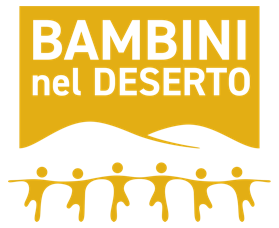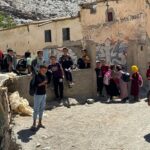Today is Bruna’s birthday (we won’t say her age, because it seems unbelievable in the face of her boundless vitality). We want to send her, in the heart of Africa, our warmest embrace and gratitude. For ten years now, Bruna has spent her time from August to January in Burkina Faso, starting the school year and following up on all the other projects which, thanks to her, we still manage to keep going despite the country’s challenging security conditions.
Typing “baobab dei bambini di nagreongo” on Google Maps, a red dot appears with a small star that marks the now legendary “school with ears.” In this remote corner of the world, there is nothing of what we are used to here: there’s no water, no electricity, no toilets, no doctors, no stores to buy what you need. Living here takes courage, even without the looming threat of terrorism.
Yet, a short account from a day at the Maison des enfants that Bruna sent us recently says so much and brings to life St. Francis’s words from his beautiful simple prayer: “For it is in giving that we receive; in pardoning that we are pardoned; in dying that we are born to eternal life.”
But we hope you’ll keep going for many more years, dear Bruna, because your dedication to peace is a great comfort to us all.
A day at Bruna Montorsi’s “Maison des enfants”
I wake up early, and some children from CE2 are already at the pump, getting water for school. Bonjour tantie! At seven, I enter the preschool yard, and a tiny chorus of kids chants “Tan-ti-bru-na,” while one new little boy who doesn’t know me yet scampers off, crying to his nanny. The “Nasara” (white lady) has that effect on the little ones. I see the cook lighting the fire with rubber, something I had already forbidden, and I remind her to use cardboard. I had already discussed this with the teachers, but…
When I get to the primary school, three classes are filled with several children, but no teachers yet. Two teachers are absent, one due to her illness and the other at the hospital with her two-year-old daughter, who is malnourished and has caught malaria.
Two children from CE2 (my first students here, now in their fourth year) run up to carry my bags. Mahamoudou tells me: “Today, you’ll put the bag in our classroom.” As soon as I sit down, I feel some little fingers in my hair, someone touching my arm, someone else my foot. If I don’t stop them, I’ll soon have more hands in my hair. They say they like it because it’s smooth. Then I shout, “Leave my hair alone!” but not very convincingly. They laugh and stop.
Today we have a theater performance of a rhyming story they invented. As they rehearse, an Inspector walks in, so I say, “Great, now you have an audience!” They act like born performers. Next, it’s time for music and dance, which they’ve been eagerly anticipating. But the solar device for playing music got left outside yesterday and instead of getting sunlight, it was soaked by a two-hour downpour. It’s no longer working. They look at me sadly. So I say, “No problem. Who knows how to make music with their hands on the table?” They start drumming like natural percussionists. I organize them so while one group plays, the others dance and take turns. They carry the rhythm inside them—they are music. Even Carine, their teacher (who’s due any day now), joins in, dancing the Warba, the “hip dance.”
In CE1, there’s a substitute teacher carrying a two-month-old baby. She does what she can, but the class is noisy, having just returned from sports activity. Reading, then geometry. They’re excited to try using compasses. Then we practice times tables, so I quickly prepare flash cards for them to play while learning. Their regular teacher, home on sick leave, even comes to check on things and lend a hand—a kind gesture.
In CP1, they’re working on the letter U. I check the notebooks and see that many children wrote V instead of U, and the teacher hadn’t corrected them. I call each child individually during break to help them fix it (and with all the calm I can muster, I correct the teacher’s work too…).
After break, everyone gathers in CE2 to watch the little play they performed. The applause is enthusiastic, and no one wants to leave. Kouka is serious and doesn’t clap. “Didn’t you like it?” I ask her. I touch her and feel that she’s burning with fever. She was sick yesterday, so we gave her a paracetamol and sent her home, telling her family to take her to the clinic. This morning, she came back to school without going to the clinic. I start making phone calls, hoping a relative might eventually pick her up.
Lunch time: everyone eats benga (rice and beans). I find myself a bowl to have some benga before the long journey back to town. I see Guibrile crying in a corner. I touch him: he’s burning up too. He went home with a fever yesterday, but no one took him to the clinic. I call his grandmother and this time I lose my patience. I know she doesn’t understand my French, but she understands my meaning. Carine, the teacher, joins in, explaining more in Moré. Hopefully, they’ll take him to the clinic this time.
When I leave and pass by the school yard, the kids rush to the fence to say goodbye. I have to stop, and they want to hear the music from the radio. I turn up the volume, and they start dancing… See you Monday. In the car, I think back on the busy morning, a day full of faces, actions, emotions, frustrations, and joys. I feel a strange, happy fatigue.

